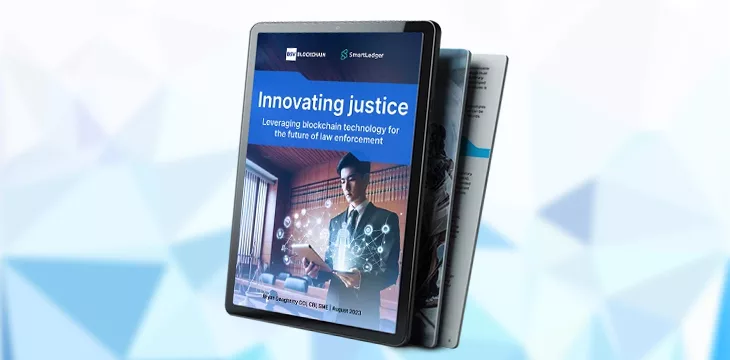|
Getting your Trinity Audio player ready...
|
Blockchain can help law enforcement and the justice system stay on top of digital transformations in wider society. It does this in a way that increases trust and transparency in an open and scalable network designed to promote efficiency and collaboration.
A new ebook from the BSV Association titled “Innovating Justice: Leveraging Blockchain Technology for the Future of Law Enforcement,” authored by prominent advocate Bryan Daugherty, is the latest in a series presenting new use cases for blockchain technology applications in another yet-to-be-fully-explored field.
The ebook’s title will not be welcomed by those who think blockchain is for “avoiding justice.” But this is a sign of how the discussion surrounding the technology has matured over the past decade and a half. Remember, any system that permits total anonymity for individuals also hands that power to corrupt officials and organized crime. And if governments and law enforcement agencies want greater transparency for ordinary individuals, the same conditions must apply equally to them.
Blockchain’s concept of a timestamped, universal truth ledger makes this more possible.
The BSV Association and SmartLedger have produced a suitably-dramatic video to explain the basics:
As Daugherty notes in the introduction, “Transparency and accountability form the bedrock of public trust in law enforcement.” New technologies have augmented crime-fighting capabilities but have also created new complexities in dealing with mountains of data, communicating between jurisdictions, and privacy issues.
“These complexities apply just as much to the general public as to governmental agencies.”
The book is an easily digestible 15 pages and covers seven main topics:
- Security and integrity of legal evidence
- Information exchange and collaboration
- Identity and personal data management
- Automation, accountability, and internal governance
- Public engagement and community safety
- Innovative approaches to law enforcement
- Integration of IPv6 and blockchain
Just as blockchain can track the progress of goods through a commercial supply chain, its immutable timestamped records can secure judicial processes. These include crime scene evidence and forensic/fraud analysis, anonymous (yet still verifiable) tip-offs, signs of tampering, recording asset seizures, and arrest warrant execution, all through court proceedings, including witness testimonies and sentencing.
The BSV blockchain‘s open nature permits greater access by disparate parties interested in solving cases or checking records, saving time in situations where this information may be critical. This also works across state and national borders. Note that blockchain transactions and stored data can always be encrypted to limit access only to those permitted to view it.
Privacy advocates (quite rightly) balk at greater intrusions in the form of surveillance and biometric identity records. However, blockchain can secure these records just as it secures evidence, permitting data integrity verification without revealing personal information. It anonymizes information in situations where this is required, such as witness protection and tracking the activities of individuals not directly involved in a case. These records also help prevent sensitive information from falling into the wrong hands, limiting identity theft/fraud opportunities.
Also, similar to supply chain monitoring, law enforcement can leverage other emerging technologies to propagate information faster. These include data from billions of IoT devices, artificial intelligence (AI) for predictive analysis, and IPv6 internet communications (5G mobile or wired).
For a blockchain to perform these tasks adequately, it must be scalable, fast, and cheap to use. As Daugherty writes, “not all blockchains are created equal” here, and to date, only BSV has demonstrated all three of these capabilities while maintaining its integrity with the superior proof-of-work (PoW) data processing algorithm.
Are you curious to hear the details on how blockchain achieves all this? “Innovating Justice” is now available for free download here on the BSV Blockchain Association’s website.
Watch: Using modern advances in cryptography to enhance data privacy—Owen Vaughan

 07-11-2025
07-11-2025 





